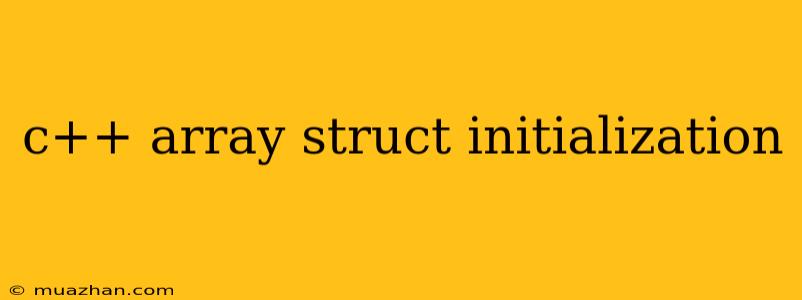C++ Array Struct Initialization
In C++, you can initialize an array of structs in several ways. Let's explore the most common and efficient methods:
1. Individual Initialization
You can initialize each struct element in the array individually.
#include
struct Student {
std::string name;
int rollNo;
float marks;
};
int main() {
Student students[3]; // Declare an array of 3 Student structs
// Initialize each struct individually
students[0].name = "Alice";
students[0].rollNo = 101;
students[0].marks = 90.5;
students[1].name = "Bob";
students[1].rollNo = 102;
students[1].marks = 85.0;
students[2].name = "Charlie";
students[2].rollNo = 103;
students[2].marks = 78.2;
// Print the student details
for (int i = 0; i < 3; i++) {
std::cout << "Name: " << students[i].name << std::endl;
std::cout << "Roll No: " << students[i].rollNo << std::endl;
std::cout << "Marks: " << students[i].marks << std::endl;
std::cout << std::endl;
}
return 0;
}
2. Using a Loop
You can use a loop to initialize the array of structs more efficiently.
#include
#include
struct Student {
std::string name;
int rollNo;
float marks;
};
int main() {
Student students[3]; // Declare an array of 3 Student structs
// Initialize using a loop
for (int i = 0; i < 3; i++) {
students[i].name = "Student " + std::to_string(i + 1);
students[i].rollNo = 101 + i;
students[i].marks = 80.0 + i * 5.0;
}
// Print the student details
for (int i = 0; i < 3; i++) {
std::cout << "Name: " << students[i].name << std::endl;
std::cout << "Roll No: " << students[i].rollNo << std::endl;
std::cout << "Marks: " << students[i].marks << std::endl;
std::cout << std::endl;
}
return 0;
}
3. Direct Initialization
You can initialize the array of structs directly at the declaration using an initializer list.
#include
#include
struct Student {
std::string name;
int rollNo;
float marks;
};
int main() {
// Declare and initialize the array directly
Student students[3] = {
{"Alice", 101, 90.5},
{"Bob", 102, 85.0},
{"Charlie", 103, 78.2}
};
// Print the student details
for (int i = 0; i < 3; i++) {
std::cout << "Name: " << students[i].name << std::endl;
std::cout << "Roll No: " << students[i].rollNo << std::endl;
std::cout << "Marks: " << students[i].marks << std::endl;
std::cout << std::endl;
}
return 0;
}
4. Initialization with Constructor
If your struct has a constructor, you can use it to initialize the array elements.
#include
#include
struct Student {
std::string name;
int rollNo;
float marks;
// Constructor
Student(std::string n, int r, float m) : name(n), rollNo(r), marks(m) {}
};
int main() {
// Declare and initialize the array using the constructor
Student students[3] = {
Student("Alice", 101, 90.5),
Student("Bob", 102, 85.0),
Student("Charlie", 103, 78.2)
};
// Print the student details
for (int i = 0; i < 3; i++) {
std::cout << "Name: " << students[i].name << std::endl;
std::cout << "Roll No: " << students[i].rollNo << std::endl;
std::cout << "Marks: " << students[i].marks << std::endl;
std::cout << std::endl;
}
return 0;
}
Choosing the Right Method
The best method for initializing an array of structs depends on your specific needs.
- Individual initialization: This is best for small arrays or when you need to customize each element individually.
- Loop initialization: This is more efficient for larger arrays or when you have a pattern for initializing the elements.
- Direct initialization: This is a concise way to initialize the array at declaration.
- Constructor initialization: This is useful for complex structs with constructors to ensure proper initialization.
